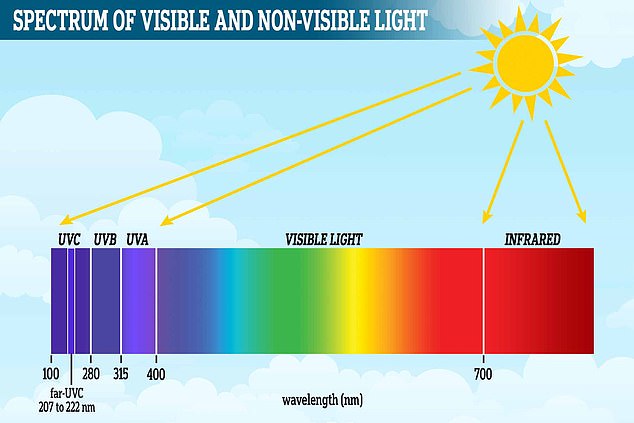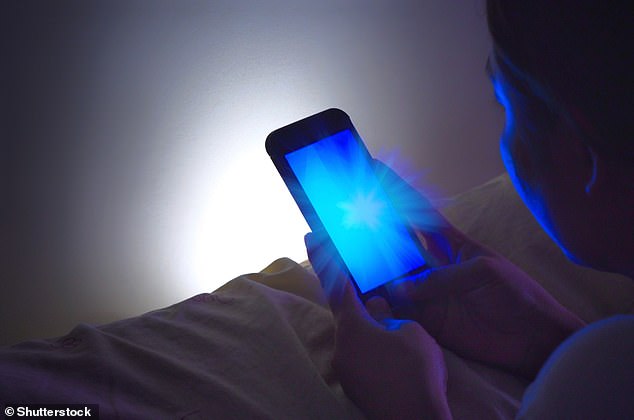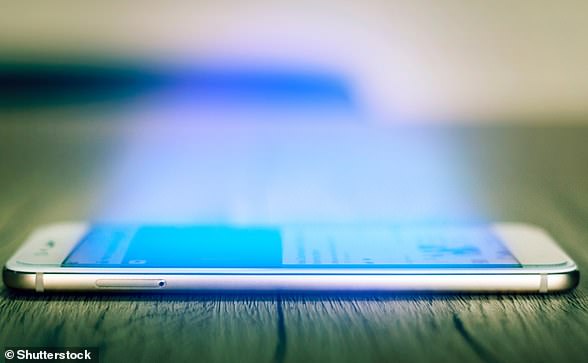Staring at your phone before bed DOESN’T make it harder to fall asleep, claims new study that contradicts official health advice
Health experts often tell us not to look at our phones right before bed because it affects our sleep.
But according to a new study, there may be no scientific basis for this at all.
Experts say there’s no decent evidence that exposing our eyes to ‘blue light’ from a screen makes it harder to fall asleep.
This contradicts official advice from health experts, including the NHS, which tells people not to use phones an hour before bed due to blue light.
Instead, the researchers think smartphones disrupt sleep simply because we can’t put them down at night.
A new study casts doubt on NHS advice that blue light from screens delays sleep. Artificial sources of blue light include smartphones, tablet and computer screens, fluorescent lamps and LED TVs (file photo)
The new study was led by Dr Michael Gradisar, a clinical psychologist and sleep expert at Flinders University in Australia.
Dr. Gradisar conducted a review of eleven studies that examined the link between smartphone light and sleep, but found no ‘meaningful’ cause and effect.
“There is no evidence from 11 studies around the world that screen light in the hour before bed makes it harder to fall asleep,” he said. the times.
“If we take a step back and look at all the factors that can be detrimental to our sleep, screens are overrated.”
One of the most convincing of the eleven studies, conducted about a decade ago, found that screen use before bed delayed falling asleep by ten minutes.
Dr. Gradisar added: “You have to ask yourself, does ten minutes really make a difference?”
It’s true that blue light – a color in the visible light spectrum that can be seen by the human eye – is emitted from the screens of phones and other devices.
It is often thought that blue light suppresses the body’s release of melatonin, a hormone that makes us feel sleepy.
That’s why the NHS suggests ‘avoiding device use at least 1 hour before bed’ for people who want a good night’s sleep.

Blue light is a color in the visible light spectrum that can be perceived by the human eye. Here the spectrum of visible and non-visible light is shown

If light activates the same pathway in humans as it does in mice, this could explain why exposure to excessive nighttime light is associated with depressive symptoms.
That’s what the NS says: ‘This includes mobile phones, tablets and TVs, as devices can emit blue light that keeps us awake by disrupting melatonin in the brain.’
It is unclear whether Dr. Gradisar disputes the effect of blue light on melatonin levels.
The main cause of phones disrupting sleep is that we can’t put them down, he claims, adding that checking your emails right before bed is a “really bad idea.”
This is echoed by Professor Russell Foster, professor of circadian neuroscience at the University of Oxford, who agrees that ‘there is no evidence that the blue light from screens has any significant impact at all’.
Professor Foster previously told MailOnline: ‘The amount of light you get from screens is relatively low.
‘If you stay up all night and are on the brightest screen it might do something, but for most people it won’t have a big effect.
“I think you have to untangle what’s going on; it’s the effect of having the phone next to your bed.
‘I’m not saying they shouldn’t be used. I say that by simply saying, “It’s the light and not the use,” it’s misleading because then kids say, “Oh, I have one of these devices that minimizes the blue light, which means I’m not going to switch my clock”.
“Yes, but you’re still using it at two in the morning.”
Professor Foster told the Times that the discovery in the 2000s that ‘light-sensitive retinal ganglion cells’ in the eyes are sensitive to blue light ‘launched a whole industry, with many different groups saying blue light is bad’.

